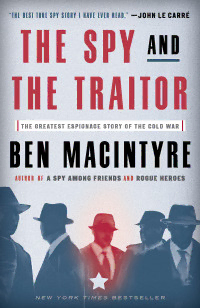Table Of ContentCover Page: a
Title Page Page: v
Copyright Page: vi
Contents Page: vi
Epigraph Page: viii
Operation PIMLICO Map Page: xi
Introduction: May 18, 1985 Page: 1
Part I Page: 5
Chapter 1: The KGB Page: 7
Chapter 2: Uncle Gormsson Page: 24
Chapter 3: SUNBEAM Page: 41
Chapter 4: Green Ink and Microfilm Page: 60
Chapter 5: A Plastic Bag and a Mars Bar Page: 84
Chapter 6: Agent BOOT Page: 106
Part II Page: 121
Chapter 7: The Safe House Page: 123
Chapter 8: Operation RYAN Page: 142
Chapter 9: Koba Page: 160
Chapter 10: Mr. Collins and Mrs. Thatcher Page: 175
Chapter 11: Russian Roulette Page: 198
Part III Page: 221
Chapter 12: Cat and Mouse Page: 223
Chapter 13: The Dry Cleaner Page: 246
Chapter 14: The Runner Page: 270
Chapter 15: Finlandia Page: 293
Epilogue: Passport for PIMLICO Page: 312
Afterword Page: 331
Code Names and Aliases Page: 337
Photo Insert Page: 338
Dedication Page: vii
Acknowledgments Page: 339
References Page: 341
Selected Bibliography Page: 347
Photo Credits Page: 351
Other Titles Page: iii
About the Author Page: 365
Excerpt from Agent Sonya Page: 365
Description:NEW YORK TIMES BESTSELLER • The celebrated author of Double Cross and Rogue Heroes returns with his greatest spy story yet, a thrilling Americans-era tale of Oleg Gordievsky, the Russian whose secret work helped hasten the end of the Cold War. “The best true spy story I have ever read.”—JOHN LE CARRÉ Named a Best Book of the Year by The Economist • Shortlisted for the Bailie Giffords Prize in Nonfiction If anyone could be considered a Russian counterpart to the infamous British double-agent Kim Philby, it was Oleg Gordievsky. The son of two KGB agents and the product of the best Soviet institutions, the savvy, sophisticated Gordievsky grew to see his nation's communism as both criminal and philistine. He took his first posting for Russian intelligence in 1968 and eventually became the Soviet Union's top man in London, but from 1973 on he was secretly working for MI6. For nearly a decade, as the Cold War reached its twilight, Gordievsky helped the West turn the tables on the KGB, exposing Russian spies and helping to foil countless intelligence plots, as the Soviet leadership grew increasingly paranoid at the United States's nuclear first-strike capabilities and brought the world closer to the brink of war. Desperate to keep the circle of trust close, MI6 never revealed Gordievsky's name to its counterparts in the CIA, which in turn grew obsessed with figuring out the identity of Britain's obviously top-level source. Their obsession ultimately doomed Gordievsky: the CIA officer assigned to identify him was none other than Aldrich Ames, the man who would become infamous for secretly spying for the Soviets. Unfolding the delicious three-way gamesmanship between America, Britain, and the Soviet Union, and culminating in the gripping cinematic beat-by-beat of Gordievsky's nail-biting escape from Moscow in 1985, Ben Macintyre's latest may be his best yet. Like the greatest novels of John le Carré, it brings readers deep into a world of treachery and betrayal, where the lines bleed between the personal and the professional, and one man's hatred of communism had the power to change the future of nations.

